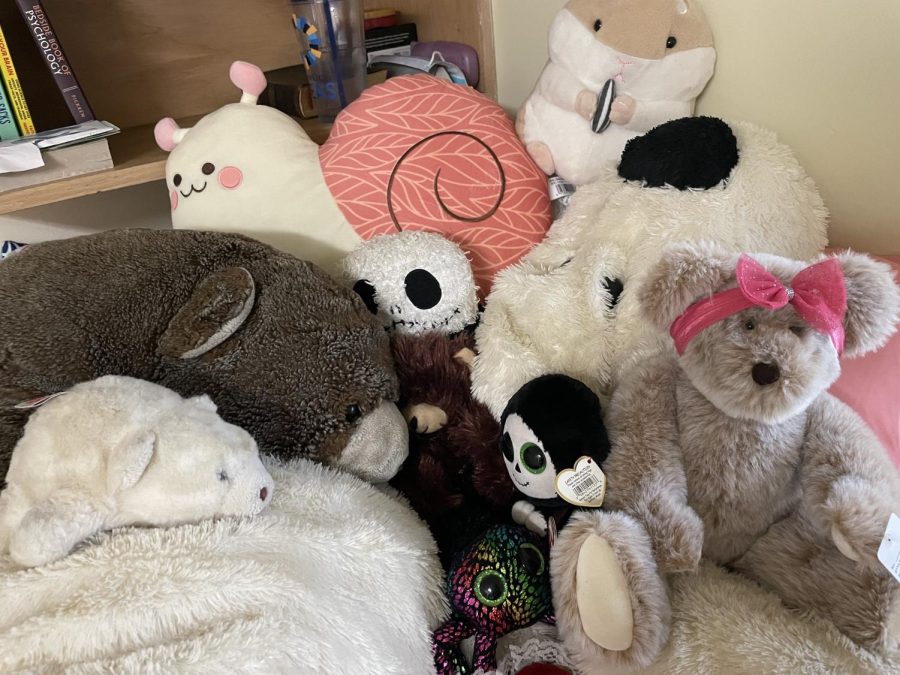Stuffed animals are necessary
Studies show that a pile of stuffed animals such as this one can improve mental health and quality of life.
Everyone has heard about how humans need four hugs daily to survive, eight hugs for maintenance, and twelve for growth. It’s a shame that those statistics are often unmet. However, I have a solution — a healthy way to achieve that quota, no matter how busy your friends or family are.
Whoever came up with the idea of stuffed animals deserve an award for the sheer comfort they can offer us. Stuffed animals are the peak of emotional support. Even those who aren’t as keen about touching animals or other humans can benefit from having an inanimate, furry friend. And, as someone who has always had a soft spot for stuffed animals, I can attest that teddy bears are the greatest invention since the wheel.
When I was fresh from the womb, even though I was raised in less than ideal conditions, I always had this one teddy bear: Snuggles. To this day, as he approaches sixteen years of age, he’s still my prized possession. Snuggles — amongst the dozens of other stuffed animals I’ve collected over the years — is what makes my days brighter.
I was a rather introverted and neglected child, but Snuggles and my army of fluffy toys were always there for hugs and rants and reassurance. It might be perceived as sad or not as effective as the comfort from a living, breathing human or animal, but research shows otherwise.
Hugging and cuddling a teddy bear, in reality, enacts the same hormonal responses as a living creature would. When cuddling something soft and comforting and humanoid, levels of cortisol — a stress hormone — are greatly lowered from physical contact. Alongside that, comfort releases oxytocin, a hormone that relaxes and soothes the mind.
But research shows that stuffed animals do the same things for us. They serve as much, much more than a shelf decoration or something to gaze upon from time to time. Sleeping with and cuddling a teddy bear emits the same response as, say, petting a dog would; the cortisol levels lower and the oxytocin levels rise.
And to squash the stereotypes, these experiments and research endeavors aren’t only taken from samples of children. It’s done with adults, too. Stuffed animals are making their entry into therapy as a cheaper and more accessible form of animal therapy for children and adults alike.
From my own experiences, that adds up. I was never lucky enough to experience therapy, but I’m more than certain my array of teddy bears definitely healed some wounds. And to this day, as an adult, I still harbor at least ten on my dorm bed at a time, ranging from some that are several feet long to smaller ones that sit next to the pillows. I’ve become so used to cuddling something at night that I physically cannot sleep without a stuffed animal — or a plush pillow replicate — due to the sheer comfort they give me.
Stuffed animals are useful in any situation, though. Snuggles is my go-to travel buddy because, as we all know, airports can be stressful. Anything, in fact, has the possibility of being stressful, and it’s unrealistic that you’ll always have a comfortable hand to squeeze or a calming presence by your side. That’s why even something small like a keychain teddy bear is great.
Life has a lot more to deal with than the occasional inconveniences, though; many people have lifelong battles with depression or PTSD or anxiety, to name a few. And even if it’s an off-and-on problem, mental health is hard to deal with. Once again, stuffed animals can come to the rescue. Teddy bears have been observed to ease loneliness, aid grief and generally improve mental health thanks to the biological effects they trigger.
Snuggles certainly helped me in that regard; although hugs from friends are the best, stuffed animals can be there at any time. I prefer to have one on me at all times thanks to their usefulness. Sometimes, I even fiddle with my keychains during a class to keep the boredom and sleepiness at bay. And although they say dogs are a man’s best friend, I think stuffed animals are, too.
After all, humans are social creatures. When other humans aren’t around to help comfort us, stuffed animals are. Beyond the chemistry behind stuffed animal therapy, they’re also just really great listeners. Overall, whether it’s to carry around on a keychain for anxiety or to cuddle at night and keep the loneliness at bay, everyone can benefit from having at least one stuffed animal in their life. In my case, at least, around 50 plus is the bare minimum.

Elanor Bonta is a first-year from Shanghai, China. She is majoring in psychology and minoring in biology.





